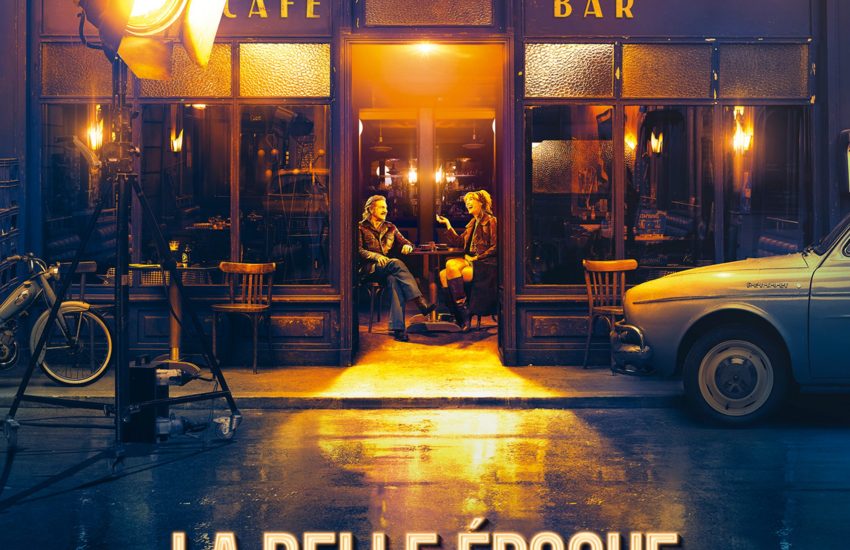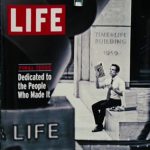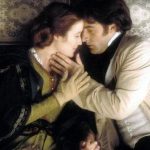I chanced upon the film La Belle Époque the other night on BBC iplayer and was captivated, so much so, that I just wanted to think about here so beware this post contains spoilers for La Belle Époque and Westworld 1,2,3.
Victor, a disillusioned sexagenarian, sees his life turned upside down on the day when Antoine, a brilliant entrepreneur, offers him a new kind of attraction: mixing theatrical artifices and historical reconstruction, this company offers his clients a chance to dive back into the era of their choice. Victor then chose to relive the most memorable week of his life: the one where, 40 years earlier, he met the great love of his life.
IMDb
Cleverly, Victor is an unemployed cartoonist who comes across the bandes dessinées (comic strip) he created back in 1974 as the most memorable week of his life was actually happening so that it is easy for Antoine and his team to recreate the experience for him image by image, word for word.
Having nothing to lose, Victor is ready, as Coleridge once said, to suspend disbelief, so on arriving at the hotel room in 1974, he shaves off his beard, colours his grey hair, and changes into his 70s flairs, to become his younger self.
This is such a hopeful scene and also a true one, as research into virtual environments shows that the stronger the narrative is and the more the environment demands of us, the more complete our experience becomes until our brains don’t know if it’s real or not and they don’t care. Victor is consequently transported back in time as he dances around the room like the carefree twentysomething he was way back then.
In 1979, Psychologist Ellen Langer put a group of 70 year-olds in a setting from 1959 and by the end of the week they had started to behave and act younger and at one point played football as if they were all 20 years younger. I once saw my own mum do it too. It was a sunny afternoon and we were visiting her in the nursing home. She was in a wheelchair, she could barely lift her cup to her lips to have a sip of water and didn’t remember who she or I was, until my little girls came in with a game of bingo they’d found in the sitting room of the home. We set it up and started playing. After a while, my mum sat straighter and held the dabber pen to mark off her numbers. She even leant over at one point and asked: What are we playing for? What do we win? She had stepped out of her reality and into her past, the one in which she loved a game of bingo.
Ready, Victor goes off to the cafe and he appreciates the whole world built for him, mumbling to himself: On est bosser dur (They’ve worked hard) and starts telling the story of how he met his wife, like a voiceover, to anyone who is listening. So he says to the actress playing his future wife: No, she threw a glass of red wine over him, not beer, as she flings a beer over the guy on the next table and then the glass of red wine Victor hands her which infuriates the actor as he is wearing his own clothes. When she gets up to answer the phone, he adds: I found out later it was the Italian guy she used to sleep with once a week and I was so jealous. And, when she leaves and he runs after her with her scarf: I remember it raining here and the one of the hands backstage says: Non, il se trompe, No he’s wrong, that was the second night. but Antoine knowing that memory is often fickle and says: Give Victor what he wants.
The experience is for one night only, but Victor wants more. To pay for the rest of the week, he accepts the job his son has been offering him for months and comme ça, Victor’s life opens and he feels full of purpose once more. During the day he goes to work and at night, he goes back to 1974. One night he goes to a party and gets high, and Antoine and his team actually make the bed spin so that Victor relives the night he got stoned exactly how it happened in that special week, the one in which he fell in love. Consequently, he falls in love all over again.
The film is so charming in this respect because we are all want to feel like that, we want to feel young and in love. We have so much energy when we are in love. I believe we often confuse feeling young for feeling full of possibility and potential which theoretically we can do at any age. We all age but it shouldn’t doesn’t mean that life shouldn’t always be full of potential and that we should give up like Victor had. After all:
Life is not measured by the number of breaths we take, but by the moments that take our breath away.
Various cheesy people quote
Daniel Auteuil plays Victor. We go way back, Daniel and I. He taught me how to speak French as I watched a lot of films on TF1 when I was living first in France and then Switzerland and since je me débrouille toujours en français (I still get by speaking French) it was a joy to watch La Belle Époque and still understand everything they were saying. And, as I was lying in front of the telly, part of me slipped back in time too, to a younger me, when Daniel Auteuil was a constant fixture on TF1 and life seemed always sunny as I rode my bike around the Alps in my own belle époque, and one day, I met the man who became my husband.
It was a sunny day, but it was winter (see what I mean about memory) and a friend in the AI lab asked me if I wanted to go skiing with him and his friend who was over from London. I came downstairs from my apartment and there was a tall, dark handsome man standing in salopettes. I did a double-take as my future husband said hello and offered me a Garibaldi biscuit, before asking me to name the best five things about living in Switzerland. I was totally bouleversé (bowled over) by his energy and the fact that he could make me laugh more than anyone else I’d ever met until that point and ever since.
That evening on the slopes as the sun went down, we found ourselves alone. We had lost everyone else including our mutual friend, whom we had last seen heading rather fast down the geschlossen (closed) piste which made us laugh since he’s half-German and should have known better. And so, we took off our snowboards and sat on them at the top of the piste to watch the pink sun set over the pine trees and behind the mountain range. Then, we turned and smiled at each other, knowing that this was a special moment, in the company of someone special, but it was too early to acknowledge it.
This summer, we will have been married for 20 years and as I write this today, my husband has been away for the whole week on business in New York. Watching La Belle Époque and having some space has helped me remember that meeting him is one of the best things that has ever happened to me. Chatting long-distance with my man has taken me back to when we first met and he lived in London and I lived in Lausanne. Every time we met up, we did so in places such as Venice, Barcelona and Naples, only because it was often cheaper for him to buy a flight to another town rather than Lausanne. Une belle époque indeed.
But as we are time travelling in this blog, if we go back to just before I met him, the other TF1 actor I watched a lot à l’époque was Vincent Cassel and now you know that, let’s fast forward once more to when I was watching Westworld with my husband not so long ago. Partway through, I turned to him as a new character was introduced and I said: Oh my! It’s Vincent Cassel. This is deeply satisfying because as I set off to write this blog, I had Westworld in mind because I wanted to compare the immersive experiences in Westworld to La Belle Epoque.
When I blogged about Westworld, I said that I wouldn’t care if I got to fall in love with a robot or not, but having watched La Belle Époque, I would add that yes our minds don’t care if it’s real or not, but we have to take it back to our current lives, our real lives. The past has gone, and it cannot return. This made me realise for the first time, that in Westworld, William cannot move on. He fell in love with Dolores back when he was a young man and was trying to set her free. He failed and Dolores was reset to live in her loop in the park and has no memory of their time together, even though he tried to recreate it over and over. Ironically this does not compute for William and so to him Dolores has ghosted him over and over for at least 30 years.
Rejection is our great fear, it is enough to for us to anticipate being rejected, and we will begin to make unhealthy choices and start to believe that we are worth less. Often our first form of defence is attack, so William commits his violence against many robots to try and see how they tick. But, he regularly rapes and murders Dolores because she is indifferent to him and because he never has to face the consequences of his actions, he stews in his hatred, rejection and obsession and by the time we meet him, he is a monster.
In contrast, Victor moves on, he realises that his experience is not real and the love he had for Marianne, the actress in 1974, is just not real, but he is still in love with his wife Marianne in the present day as she is the woman he fell in love with all those years ago. So, he goes to tell present day Marianne, in an hilarious scene where Victor’s ex-boss is in bed with Marianne wearing Victor’s pyjamas as he has moved in and instead of being her sexy lover, he has taken Victor’s place and Marianne still needs VR to enhance her sex life. Victor compliments his ex-boss on how good he looks in Victor’s pyjamas and then explains to Marianne how he got the chance to fall in love with her all over again, which he had forgotten over 40 years of marriage and he is glad but sorry that he sold their summer home in Biarritz to bankroll the experience.
Towards the end of the film, they have a most gratifying denouement. Victor is back in the cafe in 1974 and Marianne comes in, not the actress, but her as she is in the present day. She sits down and they begin to remember the night together. Marianne breaks the fourth wall by saying: Vouz pouvez éteindre vos clopes (you can stop smoking) and all the actors groan a sigh of relief and collectively stub out their fags. Marianne says that she hates feeling like she is in a big ashtray, as L. P. Hartley once said: The past is a foreign country, they do things differently there, and Marianne for one is glad that no one smokes anymore, rapists are prosecuted, and women can get abortions if they need them. When the phone rings, and it’s her Italian lover, she shakes her head, saying that she is not here. Reinvigorated by their reminiscing, when Marianne and Victor return to the present, there is a hope for the marriage once more.
Coincidentally last night, my husband bumped into one of his old university friends who is also in New York on business – small world – and they stayed up late reminiscing and talking about being middle-aged, in a moment of life imitating art, or is it the other way round? Simultaneously, in a moment of synchronicity, I talked to my brother – a rare event – about our joint history and who we used to be. It is important to remember the past, but to remember that it is the past and things are different now.
The tagline of La Belle Époque is: What if you could relive the happiest day of your life? I am with Marianne on this one. I prefer it right now but would definitely like to have an immersive experience in which I could step through my past to recharge, remember and bring it forward. I wouldn’t mind seeing it as Marianne does, through my husband’s eyes, as I’ve seen it through my own, although even that would be nice. When we fall in love, as I’ve said before when talking about big data, we yearn to be seen through new eyes, or at the very least rediscover ourselves in new and interesting ways. It can be hard to discover new things about ourselves if we feel stuck in a situation and so it is good to remember why we chose to put ourselves in certain jobs, homes, relationships in the first place.
It has been a long week and it’s not over yet but already I can’t wait to see my husband. The pleasure of having so much history with him is that, I get to experience past, present and future in the now, anyway everyday, even without an immersive experience. So for me, it will be enough to look into his kind hazel eyes and tell him how much I love him as I welcome him back into my life.







Such a thought provoking blog Ruth and reading it affords one the opportunity to reflect and experience one’s own “moment” in time. Fabulous!
Thanks Liz, yes sometimes it’s nice to look back in order to enjoy the now, Ruth